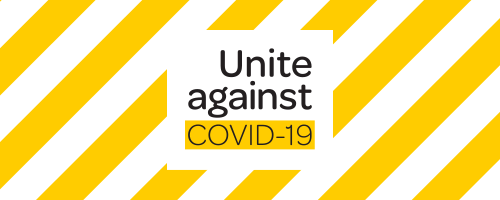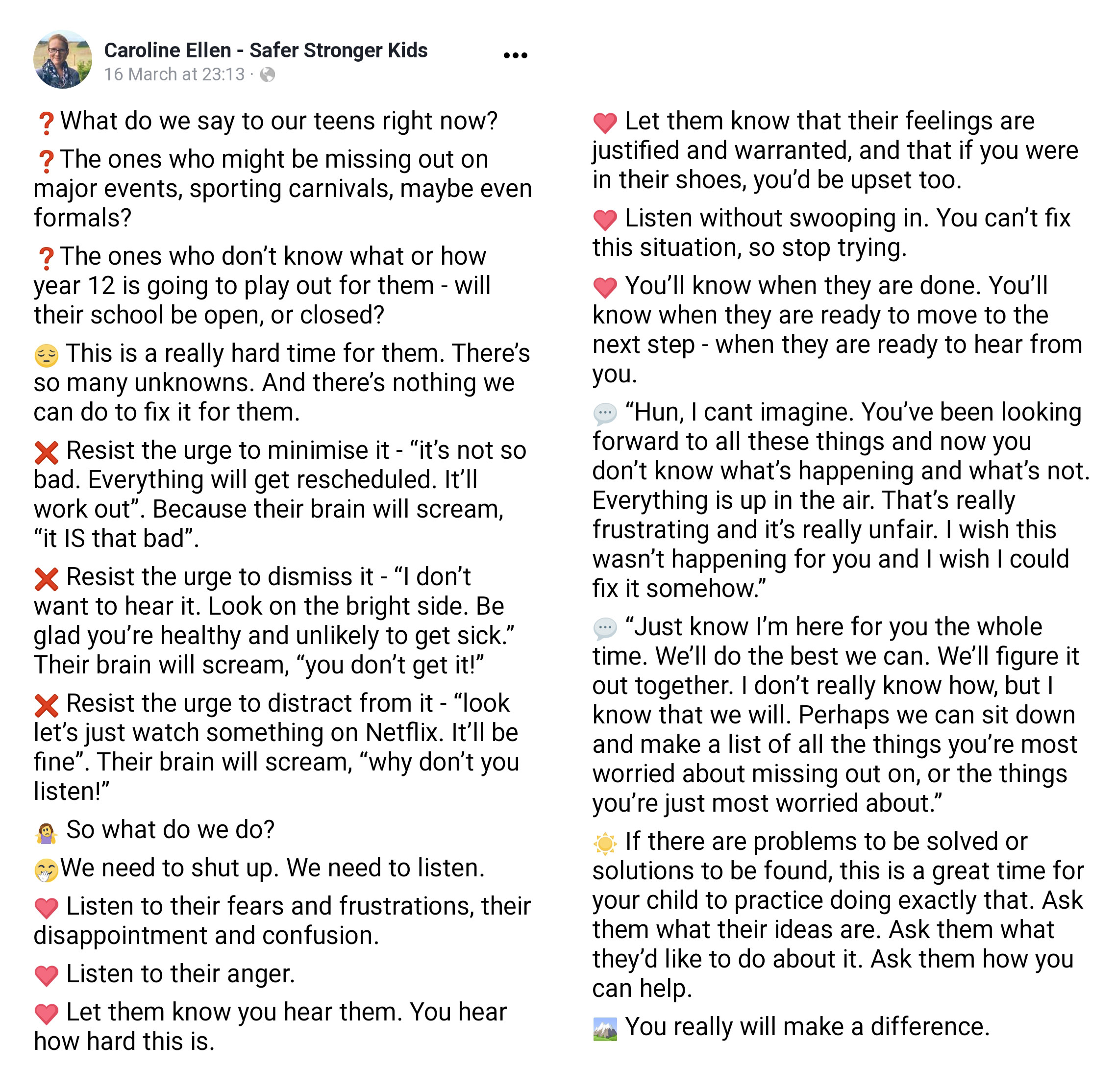
Created by Sektor NZ with content from NZRU and Dr Paul Wood
This is a period of unprecedented challenge in our lifetime, one that requires us to help each other, support each other and look after our families and communities.
Most of us are creatures of habit. When things go as planned, we feel in control. But when life throws a curveball, it can leave us feeling anxious and stressed. During times like this it is very normal to feel levels of uncertainty and anxiety, and many of those around you will also be feeling the same.
When we spend a lot of time thinking about the uncertainty or worrying it can trigger a stress response in us with negative thoughts, beliefs or attitudes. However, there are things we can do to help us cope. This document provides some ideas and strategies to help you look after your own wellbeing and that of others including:
- Strategies to look after you
- Looking after children and young people
- Tips if you’re self-isolating or working remotely
- Where to find support and how to give it to others
What anxiety looks like
Anxiety can look and feel differently from person to person, however some of the more common experiences can include:
- Edginess and irritability
- Tearfulness
- Raised heart rate
- Sleep difficulty
- Racing / negative thoughts
- Headaches
- Stomach and gut problems
- Feelings of dread
Sometimes living with high levels of uncertainty and anxiety means it is hard to get on with everyday life. There can be a sense of helplessness and a continual worry about not being able to do ‘normal things’. When we are in this way of thinking gloom can set in and it can be hard to lift ourselves out. Persistent worry can prevent you from resting or relaxing, both of which are important for our wellbeing. Finding a few strategies that work for you and can make it easier to cope with a situation where there is lots of uncertainty.
Strategies to look after you
Below are some suggestions of things that can help to look after your wellbeing, and your families, during times of disruption and potentially needing to work remotely.
Maintain your routine as much as possible
When you find yourself in a situation with lots of unknowns, maintaining a routine can help reduce stress by providing some stability. Try and maintain habits and activities already in your diary where possible and block out time to do things you enjoy doing as if they were appointments. If working from home, get dressed in the morning or go for that run that you normally would.
Remember: self-care is a discipline.
Control what you can
Focus on the things that are within your control, even if it’s as simple as weekly meal planning and doing something small to take care of yourself e.g. taking a bath. Establish routines to give your days and weeks some comforting structure.
Dr Paul Wood’s Circle of Control diagram
https://www.sektor.co.nz/UserFiles/Home/Content/Resources/Circle%20of%20Focus.pdf
Get daily tips from Dr Paul Wood – only a couple of mins each work day
https://www.youtube.com/channel/UCbKqJ1BuoQMScnneCHZ3MMA
Spend time with others virtually
Many people isolate themselves when they’re feeling anxious and worried. Connecting with others is a powerful support tool.
You can still do this remotely by phone calls, texting, messaging, or other virtual tools and apps which will help you stay connected and feel supported. Try having Virtual Parties and Virtual Games Nights. Virtual visits to closed museums and Art Galleries is another way to connect with others.
Houseparty https://houseparty.com/ (iOS, Android, macOS, Chrome)
Virtual Games Nights https://dailyhive.com/vancouver/virtual-game-night-play
Art Home https://docs.google.com/document/d/1EVMQiHHKugF4RQ071DzimkSKn1AuiBNOJ-i6xs1mBts/mobilebasic
Talk it out
If you’re finding it hard to cope, talking to others can offer a sense of comfort and remind you you’re not going through things alone. Identify someone you trust to share with, that could be your partner, a friend, your manager or colleague.
Mindfulness
Mindfulness is a handy way to create small circuit breakers in your day where you can pause, check-in with how you’re feeling or just take a moment to breathe and slow things down. The research says just 15 minutes a day can have a massive impact on your mood and overall wellbeing.
Try these apps on your phone/iPad/tablet, they are free and available for Android and iOS.
Headspace – Guided Meditation and Mindfulness


Rootd – Panic Attack & Anxiety Relief

 *The basic version is free, plus you can trial the extended version at no extra costs until 30 April using promo code SUPPORT2020
*The basic version is free, plus you can trial the extended version at no extra costs until 30 April using promo code SUPPORT2020
Mentemia
Helps you identify where you might be struggling, then gives you access to simple, safe and fun exercises to help you thrive.
Gratitude
Research shows practicing gratitude can train our brain into maintaining a more positive and resilient mind set, giving us the strength and motivation we need to deal with adversities.
Practicing gratitude can be as simple as writing down three simple things you’re grateful for each day or verbalising them with a loved one.
Keep physically active (see Government rules for outside exercise here)
Staying active can be another way to support your mood and improve your overall sense of wellbeing while boosting your immunity. Try to block out space two or three times a week to go for a walk, run or do an online fitness program like My Fitness Pal or Yoga programme at home.
My Fitness Pal
Daily Yoga – Yoga Fitness Plans
Limit your media exposure about the COVID-19
Although it’s important to keep up to date with developments and any important information, try and limit your media exposure to a few key sources. The NZ Government https://covid19.govt.nz/ is a good place to start.
Practice Kindness
It works on a physiological level: Stress is bad for the immune system, but kindness buffers stress. So check on the elderly and vulnerable in your neighbourhood, make sure they can access groceries and their medicine, check they have family to call otherwise give them your number as a backup.
NZ Government has created a form you can fill out and leave in letters boxes for the Elderly neighbours or other people who may not be online or able to get out offering help: https://covid19.govt.nz/assets/resources/COVID-19_Community-Card.pdf
Shop online
If going to the supermarket is adding to your anxiety, then change to online ordering. The supermarkets have plenty of supply, they just can’t get the shelves stocked fast enough, so if we can give them time they will. They have also introduced new procedures limiting the number in the store and keeping physically distant.
Take a Breath
By taking a moment to pause in a stressful situation you can slow down or reduce the anxiety Practice the Box Breathing Method Link to video with to how-to instructions here.
Know the Symptoms of COVID-19
Looking after children and young people
This is a really hard time for them. There are so many unknowns. And there’s nothing we can do to fix it for them, other than trying to understand what they are feeling and talking to them about it.
Some of the strategies for looking after yourself also apply to looking after children and young people in your care. Children and young people benefit most from factual, age-appropriate information as it can often prevent their worries and concerns from becoming overwhelming. Letting a child/young person’s questions guide the information you give can be a handy tool.
Reassure
Children can often be pondering big questions when there is uncertainty present, they may ask “will I get sick? Will granny/grandad die?”
Teenagers may be more concerned about their sports events or school balls being cancelled. Resist the urge to minimise it.
Nano Girl: Video How to talk to Kids about COVID-19
How to talk to Teens by Caroline Ellen: Click image to view full size.
Give honest and accurate information
Letting a child or young person’s questions guide what you share is a good place to start. Giving age-appropriate, clear and accurate information is important. Explain that not everyone will get the virus and the vast majority who do will recover fully.
Make yourself available
Children may need extra attention from you at the moment and may want to talk about their fear and worries. Let them know you love them and show them plenty of affection. Keep an eye out for clues they may want to talk, such as hovering around while you cook dinner etc. It is very typical for younger children to ask a few questions, return to playing, then come back and ask more.
Monitor TV and social media viewing
Try and avoid constantly monitoring or talking about updates of COVID-19 as this can heighten anxiety, Instead, give brief updates where necessary e.g. if there is a change to their school schedule.
Maintain a normal routine
Try and keep a regular, consistent routine (mealtimes, bedtimes etc.) to help signal that their routines are under control and will continue as normal. Encourage them to keep up with their schoolwork and extracurricular activities where possible as well as healthy habits such as regular physical activity and making healthy food choices.
Together we can slow the spread.
What does self-isolation mean?
Self-isolation means staying at home. The Government has asked all New Zealanders to stay at home to help stop the spread of COVID-19.
You can leave your house to:
- Access essential services, like buying groceries, or going to a bank or the pharmacy.
- Go to work if you have been identified as an essential employee at an essential service.
- Go for a walk, or exercise and enjoy nature but only with your household bubble.
- If you do leave your house, you must keep a 2 metre distance from other people at all times.
What you cannot do:
- Go work because it’s too hard to work at home.
- Go to any event or gathering or visit with friends or family unless they are only interacting with you. It’s better to just stay in your household bubble to get through this quicker.
- Exercise is a walk in your neighbourhood, not heading to tracks or parks, or hunting or fishing.
Print your Stay at home plan found here
What is the difference between Staying at home and Self Isolating?
The Government may ask you to Self-Isolate if you are a close contact or have just returned back to NZ
- You must self-isolate in a separate room to the rest of the family
- You must use a separate bathroom and take your meals separately
- You can go for a walk etc but must do this by yourself
Self-Isolating Tips
Keep catch-ups or meetings in the calendar and do them ‘together’
Consider setting up a standing video chat lunch or coffee catch up where you and your team can eat, drink and chat ‘together’ in front of your laptops.
Remote working means your office desk has moved from your office building to your home. You can continue to go outside and go for a walk but do this on your own under Level 4 advice.
Set-up a group text message chat
Use WhatsApp or other messaging apps so you can connect with those mates and colleagues outside of your immediate family.
Try and continue activities you’d normally do in your downtime
If you are self-isolating from friends or family watch a movie or TV show at the same time—there are tools for syncing up Netflix across multiple computers and for streaming the same videos on different screens.
NZ Government Isolation Information Here NZ Government Alert Levels Poster Here
HEALTHLINE 0800 611 116 IS THE DEDICATED HELPLINE FOR THOSE PEOPLE IN SELF-ISOLATION
Remote Working tips
Working environment from home
Where you work and how it is set up can have a big impact on how you feel. Consider setting up a nice, tidy and clean workspace free from distraction and clutter.
Spark, Vodafone, 2degrees and others have all launched uncapped household broadband data plans, contact your provider to see if you have this.
Set boundaries and stick to routines if you are sharing your home-work space with your spouse or kids. Let them know your work hours and ask them to save their questions or comments till you take a break and you will do the same for them. Use the time you would have been commuting to take some extra care of yourself, get some exercise, read a book, whatever will help you relax and prepare for your workday.
Think about how you can separate each to different parts of the house. If you can’t then set up times that you might have the kitchen table and quiet while you make calls. If you have noise-cancelling headsets this might help while other people are making calls.
Exercise where you can
Whilst you can’t get to the gym when you are self-isolating, you can still exercise using bodyweight movements such as burpees, squats, lunges and push-ups as well as running, walking or cycling (being mindful of your proximity to others).
Watch out for Scams
Scams and frauds exploiting the spread of COVID-19 have been noted overseas and are expected to be seen in New Zealand. They may arrive in the form of an email, text, phone call or through social media.
For more information on what to watch out for and where to report scams, visit the following websites:
COVID-19 Investment scams: Financial Markets Authority
COVID-19 Phishing and cyber scams: CERT
General COVID-19 Scam information: CFFC
Learn how to stay safe online with our “What the fox…is this Cyber Security thing?” click here
Support: where can I find it and how can I give it?
GP
If you’re noticing that you or someone you know is experiencing stress or distress symptoms that are sticking around over days or weeks, then getting in touch with your GP is a good place to start. Make sure you call them before you head in, as wait times may be long.
1737 helpline
1737 is the national free to call or text helpline number.
The service is staffed with fully trained counsellors and is available 24/7 for advice or support on anything to do with mental health and wellbeing.
Whanau, friends, community
During times of stress and worry, connecting with those existing supports around you is one of the best ways to support both yourself and those you care about. Be proactive in reaching out, creating space to spend time with your loved ones and talking about what you’re thinking and feeling.
Other helpful links:
http://www.mentalhealth.org.nz/home/ways-to-wellbeing/
http://www.mentalhealth.org.nz/get-help/in-crisis/helplines/
http://www.health.govt.nz/our-work/diseases-and-conditions/covid-19-novel-coronavirus
http://www.covid19.govt.nz
Want to check-in on someone but not quite sure how?
We when we have a gut feeling someone might be struggling the hardest part can sometimes be starting a conversation. Use the ALEC model below to guide you on how to check-in.
ASK – Simply asking “are you doing OK” or “how are you coping with things lately?” is a good start.
LISTEN – Try using open-ended questions like “that sounds really tough, can you tell me more about that?” ENCOURAGE – Ask questions about what they think might be helpful. It’s also ok to not know what to say but let them know you’ll help them find the right support.
CHECK BACK IN – Make sure you take responsibility to lock-in when you’ll catch up next. Be specific about a day and time and avoid saying things like “text me if you need me”.


